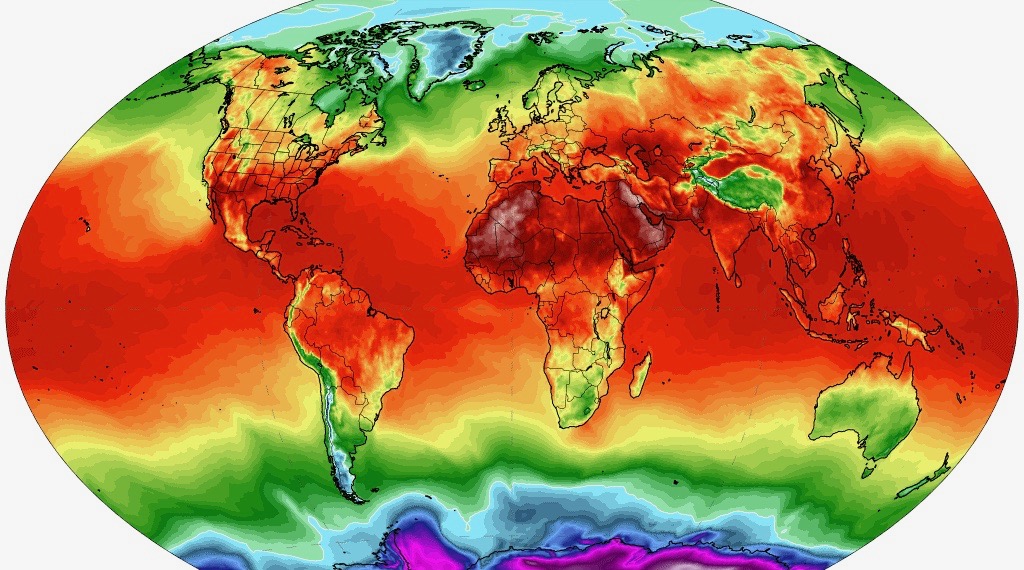Opinion: I Don’t Like Bad News

The featured image is from ClimateReanalyzer.com, from the Climate Change Institute, University of Maine, USA, and is used with permission. It shows global air temperatures on July 7, 2023.
Love, Justice And Climate Change

I don’t like bad news. I don’t like reading that July 3, 4, and 6 each set a new record for the hottest average global temperature on Earth, for as long as records have been kept and, according to scientists’ best estimates, the hottest day in the last 125,000 years.
I don’t like reading that parts of China are suffering under a prolonged heat wave with temperatures up to 110° F; that 1.8 million Muslims on the hajj pilgrimage in Saudi Arabia encountered 118°F temperatures; or that scientists are alarmed at the “totally unprecedented” heat wave in the waters of the North Atlantic–melting sea ice and disrupting important currents.
I don’t like reading that wealthy nations and corporations blocked significant progress at the June UN climate session in Bonn, Germany that was designed to prepare proposals for the next big UN climate conference, COP 28, this coming December. “The Bonn Climate Conference laid bare the glaring hypocrisy of wealthy nations, showcasing a remarkable indifference to the struggles of developing countries,” said Harjeet Singh, head of global political strategy at Climate Action Network, which includes more than 1,500 civil society groups.
Not Getting Stuck In Hopelessness Or Avoidance
So, what do we do with bad climate news? I think it is important that we all develop workable approaches to this situation. We are certainly going to encounter plenty more bad news about the climate crisis in the months and years ahead. We don’t want knowing what’s happening in the climate crisis to leave us depressed, hopeless, or overwhelmed. We don’t want it to sap our energy for demanding and organizing others to demand workable solutions to the global emergency. We also don’t want it to force us to turn away from paying attention to what’s happening to keep ourselves from going under.
What Do We Do?
I written before about the importance of choosing to be hopeful and about bolstering our hopefulness by learning, remembering, and sharing good news about the climate. I think these continue to be important strategies for us. I’ll share some good news toward the end of this post.
We Are Not Dependent On Hope
Hope is very useful and can energize us to move boldly forward. However, we are not dependent on hope. When we can’t find hope, we can move forward on the basis of our commitment – our commitment to justice and our commitment to act for the preservation of all living things. When we can’t find hope, we can move forward on the basis of our love – our love for all humanity, for living creatures, and for the natural environment.
We will have better lives if we choose to do the right thing, (or do anything that will help slow global warming) even without any assurance that it will lead to eventual victory in the climate struggle.
Every Bit Matters
I find it useful to remember that every fraction of a degree of global warming that we can avoid or delay will reduce the suffering of millions of people around the world and provide more time for humanity to implement good solutions. Every bit matters.
The Power Of Collective Action
Virtually all of us have some feelings that we can’t make much difference when we are up against something as large as global climate change. These feeling can lead us to avoid the issue altogether or to have difficulty sustaining any significant action. Some of this comes from the focus on individualism in our culture. The emphasis on doing things on our own has left us confused about the power of collective action.
No one of us is going to make a sufficient difference to end climate change, but when millions of us join together, the impossible becomes possible. There is a groundswell of people around the world demanding action and taking action to solve the climate emergency. That groundswell is weaker if your voice is missing. Each voice amplifies the movement. No matter how insignificant we feel, we can decide to do our part.
Actions We Can Take Now
There are many things we can do, of course. You can find seven different suggestions in one of my earlier posts. “Inside the Movement” provides constantly updated quick action opportunities. In a future post I’ll offer some possibilities for moving things ahead in your own municipality.
I still don’t like bad climate news, but let’s use it to spur us to greater initiative, vitality, and connection with other people and become more outspoken as part of the groundswell of support for climate action at all levels.
Good News
While I don’t think we need be dependent on good news, I do think we can use its benefits. Here are a few items that have cheered me recently:
Senegal has reached a Just Energy Transition Partnership agreement with a group of wealthy nations. The agreement, backed by France, Germany, the UK, Canada and the EU, will provide the African nation with an additional $2.7 billion in financing to be used to install new renewable energy generation capacity sufficient to provide 40% of energy from renewables by 2030.
China has continued to accelerate its installation of wind and solar power and is on course to reach its 2030 goal by 2025. China now has more utility-scale solar installed than the rest of the world combined.
The state of Texas, the top U.S. producer of oil and gas, has been hit by a scorching heat wave. They have managed to keep the lights on and air conditioners running only because of tremendous recent growth in solar panels, wind turbines, and giant batteries. Despite politicians opposing renewable energy, Texas now gets more electricity from in-state wind power than any other state and is second only to California in solar power.
I encourage you to tell people these good news items. Please share other good news you encounter in the “Leave a Reply” box below this post.
Russ Vernon-Jones was principal of Fort River School 1990-2008 and is currently a member of the Steering Committee of Climate Action Now-Western Massachusetts. He blogs regularly on climate justice at www.russvernonjones.org.
